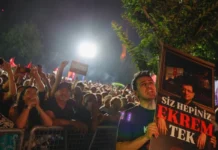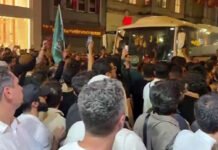Turkish authorities briefly detained Memduh Çalışan, who went viral on social media after posting a video of himself complaining about the unavailability of services in Kurdish at an İstanbul airport, local media reported.
Çalışan was released after he was taken into custody on accusations of “disseminating misleading information” and subsequently questioned by prosecutors.
In the video he posted, he had reacted to the lack of Kurdish-language services at the airport, which led to his mother being stranded for hours.
“The Arabs, the Azeris and the English get their languages, while my mother doesn’t,” he had said. “She wasn’t able to explain herself, which is a shame for Turkey.”
The İstanbul Governor’s Office released a statement accusing Çalışan of spreading propaganda against the state.
Turkish authorities routinely detain people over social media content on charges such as insult, misinformation, terrorist propaganda, denigrating the state or fomenting hatred.
Despite being Turkey’s largest minority, Kurds do not have official recognition, and their language is generally excluded from public sphere with the exception of certain progress made in the early 2000s as part of the country’s now-frozen EU accession process.
Although some restrictions on the use of the Kurdish language have been eased, such as in the media, anti-government media outlets broadcasting in Kurdish continue to face harassment, intimidation and abusive prosecution.
Courts usually do not allow individuals to make statements in Kurdish, and prisons charge inmates translation fees for the review of Kurdish-language publications or letters that they exchange with the outside world.
Kurds continue to suffer hate speech and hate crimes for speaking their language in public, such as a language teacher who last year received numerous threats over a video in which she was seen teaching children the Kurdish names of southeastern provinces.
The Kurdish language is also usually excluded from public services such as multilingual health or safety-related pamphlets or hotlines that often include languages of much smaller immigrant or expatriate communities such as Arabic and Russian.















